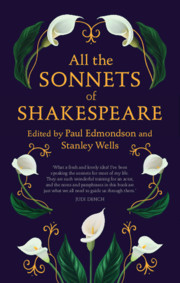
How can I then return in happy plight, XXIX. Weary with toil, I haste me to my bed, XXVIII. Lord of my love, to whom in vassalage XXVII. Let those who are in favour with their stars XXVI. Mine eye hath play'd the painter and hath stell'd XXV. My glass shall not persuade me I am old, XXIII. So is it not with me as with that Muse XXII. A woman's face with Nature's own hand painted XXI. Devouring Time, blunt thou the lion's paws, XX. Shall I compare thee to a summer's day? XIX. Who will believe my verse in time to come, XVIII. But wherefore do not you a mightier way XVII. When I consider every thing that grows XVI. Not from the stars do I my judgment pluck XV. O, that you were yourself! but, love, you are XIV. When I do count the clock that tells the time, XIII. As fast as thou shalt wane, so fast thou growest XII. For shame! deny that thou bear'st love to any, XI. Music to hear, why hear'st thou music sadly? IX. Lo! in the orient when the gracious light VIII.

Then let not winter's ragged hand deface VII. Those hours, that with gentle work did frame VI. Unthrifty loveliness, why dost thou spend V. Look in thy glass, and tell the face thou viewest IV. When forty winters shall beseige thy brow, III. FROM fairest creatures we desire increase, II.

Shakespeare preserves his friend in the lines of the poem, where he will live forever, even after his natural death.You can buy the Arden text of these sonnets from the online bookstore: Shakespeare's Sonnets (Arden Shakespeare: Third Series) I. It is also one of the most eloquent statements of the power of the written word. The opening line of the sonnet is one of the most quoted Shakespearean lines. In the sonnets, Shakespeare is urging his friend to marry and have children because his qualities and beauty are such that it would be a tragedy not to pass them on to a new generation. This is one of a sequence of sonnets written for an unidentified young male friend of Shakespeare’s. Even death will be irrelevant because the lines of verse will be read by future generations when poet and fair youth are no more. The sonnet is more than just a poem – it is a real thing that guarantees that by being described in the poem the young man’s beauty will be sustained. Sonnet 18 praises a friend, traditionally known as the ‘fair youth’. The sonnet is concerned with the relationship between man and the eventual death he will encounter. Also, the power of poetry over fate, death, and even love. The main theme is the timelessness of love and beauty, death and immortality, and in particular the immortality of art. Each Shakespeare’s play name links to a range of resources about each play: Character summaries, plot outlines, example essays and famous quotes, soliloquies and monologues: All’s Well That Ends Well Antony and Cleopatra As You Like It The Comedy of Errors Coriolanus Cymbeline Hamlet Henry IV Part 1 Henry IV Part 2 Henry VIII Henry VI Part 1 Henry VI Part 2 Henry VI Part 3 Henry V Julius Caesar King John King Lear Loves Labour’s Lost Macbeth Measure for Measure The Merchant of Venice The Merry Wives of Windsor A Midsummer Night’s Dream Much Ado About Nothing Othello Pericles Richard II Richard III Romeo & Juliet The Taming of the Shrew The Tempest Timon of Athens Titus Andronicus Troilus & Cressida Twelfth Night The Two Gentlemen of Verona The Winter’s TaleĬommon questions What is the theme of the sonnet? This list of Shakespeare plays brings together all 38 plays in alphabetical order.
/Sonnet_73-591778e13df78c7a8c82ccf3.jpg)
Plays It is believed that Shakespeare wrote 38 plays in total between 15.


 0 kommentar(er)
0 kommentar(er)
